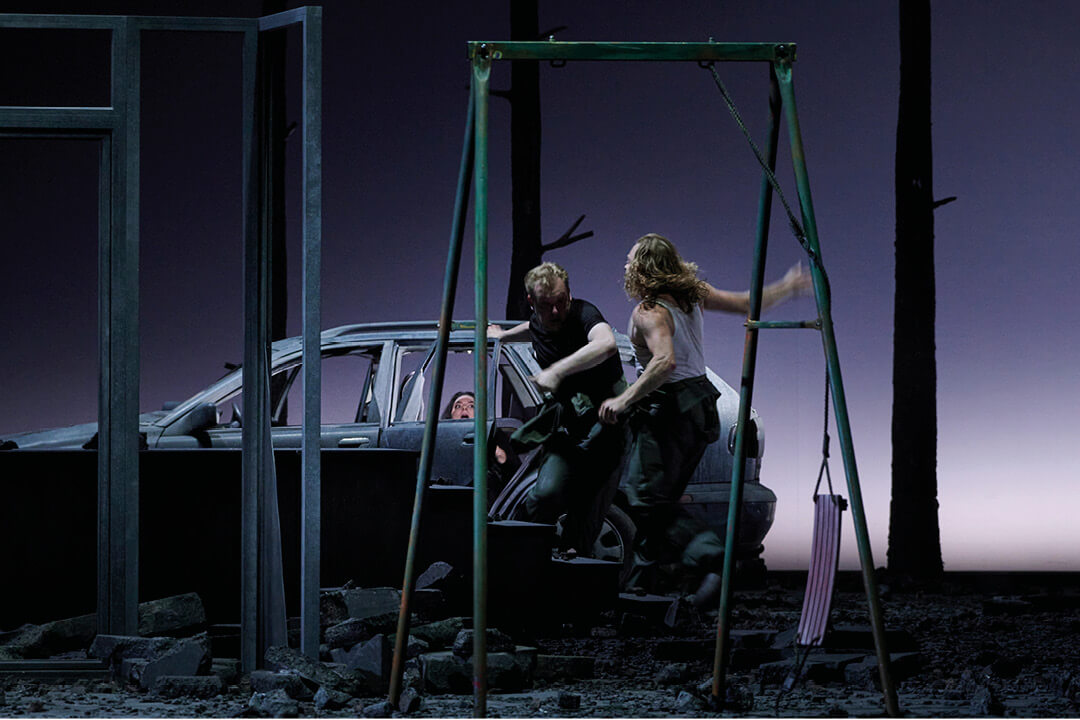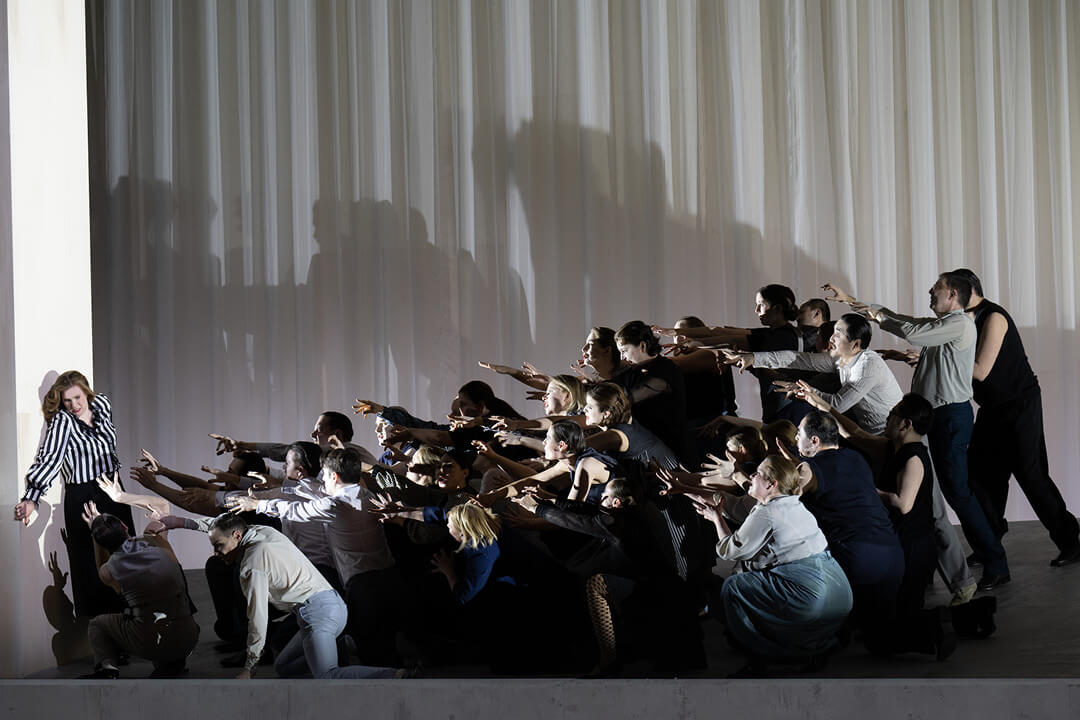Opera houses are a treasure for everyone
There are around 80 state and municipal opera houses in Germany. There are also a large number of festivals at which operas are performed.
Only the experience is elitist in the opera house
Spending two, three or even four to five hours, for example at a Wagner opera, without a cell phone: It doesn’t get much more exclusive than that. The view of the stage is also free of the cell phones that are raised in the air at every pop concert or sporting event.
The heart and brain can concentrate on the combination of singing, music and stage design, which, according to neuropsychologists, creates “emotional goose bumps” in the opera.
In this sense, opera can certainly be described as elitist, because it offers an experience in the auditorium that is not available elsewhere. In addition to the prejudice that opera is elitist, there are many other prejudices that are a thing of the past.
 Frankfurt Opera, Amadigi, George Frideric Handel, 2021 © Barbara-Aumüller
Frankfurt Opera, Amadigi, George Frideric Handel, 2021 © Barbara-Aumüller
7 prejudices against opera
Prejudice 1 Admission prices
Compared to attending a concert by Adele, Taylor Swift or another pop star, a visit to an opera house is cheap. At least in Germany with its wide range of opera houses. In England or the USA, where opera is largely dependent on private commercial support and generous private sponsors, the situation is different.
For a ticket to a mega pop concert in an opera house in Germany you usually get two very good tickets and instead of merchandise you could buy two glasses of Riesling and two pretzels in each interval.
This refers to the normal prices for good seats. Every opera house also offers cheap seats or discounted prices, for example in some opera houses grandparents can take up to three grandchildren for free and many opera houses offer heavily discounted or even free tickets for schoolchildren or students.
Dynamic pricing, price systems in which prices are constantly updated and formed according to current supply and demand, are increasingly being used at pop concerts. Ticket prices for a star of the rock or pop scene can quickly become astronomical. After 2-3 hours in the online “queue”, it can happen that three times the price per ticket or more is called up.
Opera houses are sticking to the prices they publish for their tickets at the start of the season.
Prejudice 2 Prior knowledge
A visit to the opera can be great fun even without any prior knowledge. The texts are available in German and English in most opera houses. Almost all opera houses offer excellent introductory lectures (live or digital).
Many opera houses or festivals are supported by sponsoring associations that give their members the opportunity to take part in background discussions that allow them to gain an even deeper insight into an interesting opera and the respective directorial concept.
Even if you don’t have the time or inclination to get involved in the opera’s story, the music in combination with the visuals still make an impact.
Prejudice 3 Stories from yesterday
The majority of the operas deal with love, jealousy, striving for power, lies, confusion, ambition, war and longing and thus the core questions of human existence.
It couldn’t be more topical: however, opera presents these themes far more charmingly than any news portal. No wonder that many people reflect on their own lives during an opera and leave the opera with new thoughts or resolutions.
Prejudice 4 Ecology
Can something that has existed for centuries be green? It can. To the chagrin of many city treasurers, many cities have opera houses with a long history. The energy balance is therefore not always excellent, but demolition and new construction require a lot of CO2 and new opera houses are planned with energy efficiency in mind.
 Frankfurt Opera, The first humans, Rudi Stephan, 2023 © Matthias Baus
Frankfurt Opera, The first humans, Rudi Stephan, 2023 © Matthias Baus
For some years now, many theaters have been trying to use stage sets more sparingly in a kind of circular economy. The majority of opera employees live locally and can get to work by bike or bus and train. Guest artists usually travel not just for one evening but for weeks at a time. They are also happy to travel by train if possible, as the air conditioning in airplanes is a potential danger for every voice.
According to the audience survey, many spectators traveled to the Taylor Swift concert in Munich by plane.
Prejudice 5 Dress code
“Come as you like” is the standard in German opera houses. Dress codes can be found in some opera houses in England, the USA and Asia. In Germany, audiences wear a mix ranging from casual wear to quiet luxury and extravagant evening dress. The latter is more likely to attract attention if the opera house is not located on the green hill in Bayreuth.
Prejudice 6 Accessibility
The 80 opera houses in Germany are spread relatively evenly across the country. There is only a concentration in Berlin with three large opera houses.
Many world-renowned opera houses, such as the Metropolitan Opera in New York or the Royal Opera House in London, have online offers that allow you to sit in the front row and enjoy top-class opera at home for little money.
Prejudice 7 Closed Society
This is an old prejudice that the current Minister for Culture likes to cite and therefore proposes to put Hansel and Gretel on the program on the Green Hill in Bayreuth. Her way of thinking is indeed elitist and outdated at the same time. Experienced opera connoisseurs recommend complex operas such as Salome or Tosca, which get under the skin emotionally, especially for beginners.
The audience in opera houses is always a reflection of society A closed society existed in the early days of opera, when princes and kings enthusiastically initiated the first opera performances. In those days, only a small select circle was invited.
Today, anyone can buy a ticket, usually online.
The mix of artists could not be more international. No wonder. In many large countries, there are very few opera houses. Getting a permanent engagement there is almost like winning the lottery, even for outstanding singers, musicians or other artists. They were all classically trained in their home countries and are delighted that these opera composers are actually performed in the land of Beethoven, Handel and Wagner. And that every day.
6534 opera performances in the 2023/2024 season in Germany
This puts Germany in first place in the statistics, followed by the USA with 2433 performances, Italy with 2168 performances and the United Kingdom with 1527 performances.
Looking at the cities in which the most opera performances took place in the 2023/2024 season, London is at the top with 742 performances, closely followed by Vienna with 683 performances, Paris with 564 performances and Berlin with 548 performances. Munich also makes it to 7th place in the statistics with 412 performances and our heartland Japan can proudly take 10th place with 188 performances in Tokyo.
The figures come from Operabase.com. Mike Gibb, opera fan and IT specialist, founded Operabase in 1976. The owners of this fascinating database, which contains information on over 690,000 opera performances and is constantly growing, come from Denmark and Switzerland.
Some of the statistics are free of charge. Other parts are financed by those who bear responsibility for opera houses. After all, nothing causes more sleepless nights than the sudden loss of a leading role. It’s good to be able to access a database that can tell you immediately who has already sung Isolde or Don Giovanni, when and where, and how you can reach the replacement.
Front runner Wolfgang Amadeus Mozart
Wolfgang Amadeus Mozart, plagued by financial worries throughout his life in Salzburg and Vienna, is now one of the world’s most frequently performed opera composers: The Magic Flute topped the list of opera performances worldwide in the 2023/2024 opera season with 1206 performances and 282 productions.
We advise you to enjoy this visual and aural luxury as often as possible. No art form reaches the brain as directly as opera performances.
Made in Germany is not only recognized worldwide in terms of quantity in the field of opera, but also in terms of quality, which is achieved by many people with a great deal of passion and commitment every day behind and on the opera stage.
Cover picture: Frankfurt Opera, Hercules, Georg Friedrich Händel, 2023 © Monika Rittershaus
#Advertising #ProductPlacement #IndependentRecommendation #BecauseWeLoveIt




